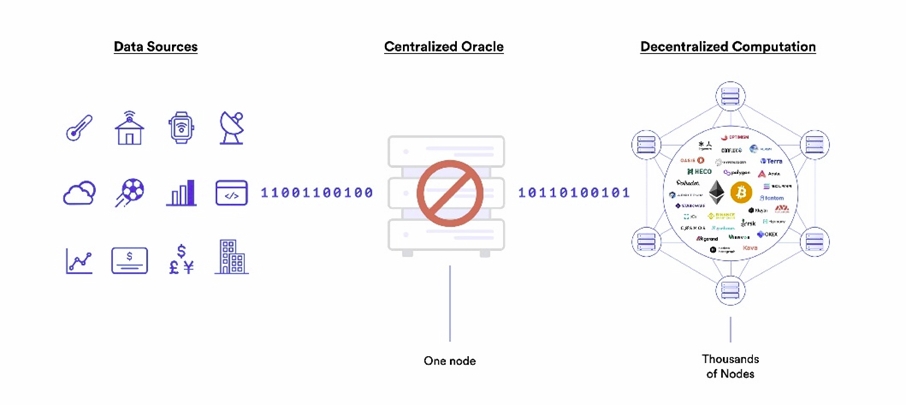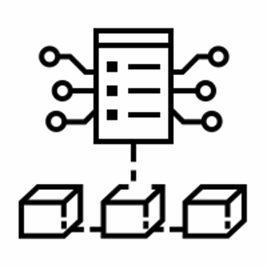💎ChainLink Descentralized Oracle
ChainLink Oracle has severeal applications, but what we want to highlight at the moment is how we are going to benefit from ChainLink Oracle Service. Compute oracles are used to generate verifiable randomness that projects then use to assign randomized traits to NFTs or to select random lucky winners in high-demand NFT drops. On-chain gaming applications also use verifiable randomness to create more engaging and unpredictable gameplay experiences like the appearance of random loot boxes or randomized matchmaking during a tournament.
We will not be using the Oracle Service to interfere or reflect on a price basis, as we have already seen in other projects that did not work. Instead, we're going to use Oracle's raffle just to be completely fair and without risk of hacking or cheating on the network.
The price of the chests, for example, is not maintained in Oracle. We will only use the Oracle security system for Masks Chain Finance because it is currently the safest system to open chests within the network without risk of cheating or injustice.
Before we get started
All Elvantis experience and interaction, including our White Paper, was written and built so everyone that reads and interact with it can comprehend the most technical information and struction in a dynamic way.
Even with the extra input about “BlockChain and Smart Contracts” that you’ll find below, to fully and better understanding of the topic it’s suggested a more detailed research.
What is a Blockchain?
Blockchain is a record-keeping technology designed to make it impossible to hack the system or forge the data stored on it, thereby making it secure and immutable. It is also considered a type of decentralized database. Instead of storing data in rows, columns, tables and files as traditional databases do, it stores data in blocks that are digitally chained together. Blockchains are isolated networks, akin to a computer with no Internet connection. It can not connect its applications to real world off-chain data and events by itself. An oracle system, for example, is required to do so. The isolation of a blockchain is the precise property that makes it extremely secure and reliable, as the network only needs to form consensus on a very basic set of binary (true/false) questions using data already stored inside of its ledger.
It plays an important role in the implementation of the project. It’s through the blockchain system that players can synchronize their wallets with the platform - store, stake and trade their NFTs and tokens, be the owners of the in-game assets, and much more.
What is a Smart Contract?
Smart contracts are computer programs that are hosted and executed on a blockchain network. They are based on the following logic: “if/when x event happens, then execute y action.”
In order to launch a project the first step is to write the codes of the contract to specify the functions it has. The next step is to deploy/migrate it to a blockchain.
When deployed to a blockchain, a smart contract is a set of instructions that can be executed without intervention from third parties. Its code defines how it res
ponds to input, just like the code of any other computer program. Once deployed to a blockchain, it is immutable and gets its own address. Smart contracts can connect to real-world market prices of assets to produce powerful applications. Securely connecting smart contracts with off-chain data and services is what makes them hybrid smart contracts. This is done using oracles.
What a Blockchain Oracle
A blockchain oracle is a secure piece of middleware that facilitates communication between blockchains and any off-chain system, including data providers, web APIs, enterprise backends, cloud providers, IoT devices, e-signatures, payment systems, other blockchains, and more.
To sum up, the oracle is an entity that connects blockchains to external systems, thereby enabling smart contracts to explore its fully potential and execute based upon inputs and outputs from the real world. They are the bridge that securely interoperate with off-chain and on-chain systems.
What is the "Oracle Problem"?
The oracle problem is one of the most important barriers to overcome if smart contracts on networks are to achieve mass adoption across a wide variety of markets and use cases, as it’s the with Masks Chain Finance.
Blockchain oracle mechanisms using a centralized entity to deliver data to a smart contract introduce a single point of failure, defeating the entire purpose of a decentralized blockchain application. If the single oracle goes offline, then the smart contract will not have access to the data required for execution or will execute improperly based on stale data.
Even worse, if the single oracle is corrupted, then the data being delivered on-chain may be highly incorrect and lead to smart contracts executing very wrong outcomes. This is commonly referred to as the “garbage in, garbage out” problem where bad inputs lead to bad outputs.
This model wouldn’t be trustable nor scalable for the size of our project.
ChainLink Descentralized Oracle
Because the data delivered by oracles to blockchains directly determines the outcomes of smart contracts, it is critically important that the oracle mechanism is correct if the agreement is to execute exactly as expected.
Decentralized oracle networks (DONs) enable the creation of hybrid smart contracts, where on-chain code and off-chain infrastructure are combined to support advanced decentralized applications (dApps) that react to real-world events and interoperate with traditional systems.
Last updated


